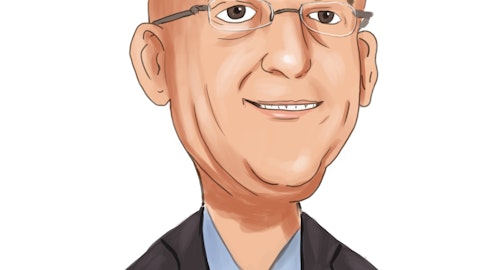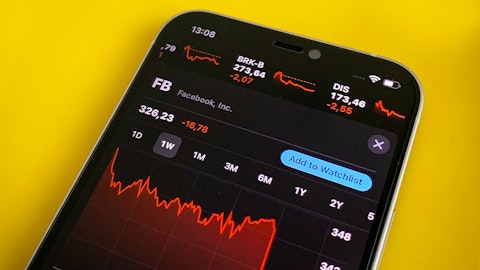Joseph C. Bartolacci: Good morning, Liam.
Steven F. Nicola: Good morning, Liam.
Liam Burke: Joe, could you give us some sense—I mean, I know the revenues on warehouse automation were down year-over-year on the project delivery a year ago, but could you give us a sense of how the backlog is doing if we normalize for that order?
Joseph C. Bartolacci: The backlog is strong. I would tell you we have almost the full year booked out, with orders continuing to come in, and that is part of that $70 million on top of the $200 million plus of orders that we receive. We gave you some color on who the clients are when we announced Lands’ End and Luxottica, largely because—I mean, some of the feedback I have received is people think that we play in the small ranges. I wish I can only describe to you the larger customers that we do business with, but they are significant players in the retail and CPG world that are using our accounts, and those come in fairly significant chunks when they come.
Liam Burke: Fair enough, and on SGK, Europe is obviously still weak. Are you seeing any stabilization there? I know you’ve had to do some adjustments on the expense side of the ledger, but are you seeing any kind of relief from what looks to be a tough market?
Joseph C. Bartolacci: What we are seeing really, frankly, which is a little bit surprising for us, is in the U.K., and other countries beyond the German-speaking world, it’s principally our German- and Polish-related businesses associated with that part of the world that are feeling the impact, but that is, as you know, Liam, a significant part of our European presence. Our U.K. team which covers some of the other countries, that manages the other countries, is feeling pretty bullish about the balance of the year. The cost actions, Liam, you recognize this is Europe, so we take charges as we have identified the plants to be able to take those actions. The ability to implement those require works councils and other negotiations that go on, so it’ll take a little bit of time throughout the balance of the quarter to get those benefits. That’s why we said third and fourth should be a far more comparable from the standpoint of improvements and seeing those flow through.
Liam Burke: Great. Thank you, Joe.
Joseph C. Bartolacci: Sure.
Operator: Thank you. Our next question is from Justin Bergner with Gabelli Funds. Please proceed with your question.
Justin Bergner, Gabelli Funds: Good morning, Joe.
Joseph C. Bartolacci: Good morning, Justin.
Justin Bergner: Good morning, Steve. How are you?
Steven C. Nicola: Good morning, Justin. Good.
Justin Bergner: The first question would be on non-energy storage-related Industrial Technologies orders. Should I see that $70 million or so as representing, you know, a book-to-bill modestly above one for the non-energy storage Industrial Technologies businesses?
Joseph C. Bartolacci: Good question. Let me kind of do the math in my head. I hadn’t really focused on it that way. I would tell you “modestly above” would probably be a fair way to look at it, but I will caution you, Justin, because it is a little lumpy. I wouldn’t say this was an extraordinary quarter by any stretch, either on the downside or on the topside, but modestly higher is a fair way to look at it.
Justin Bergner: Great, and then, as you look at your annual EBITDA guide and the first quarter, would you characterize the first quarter revenue as coming in above your own Management expectations, and if so, in which parts of the businesses?
Joseph C. Bartolacci: I would tell you our Memorialization business came in slightly higher, not significantly, but slightly higher. The balance are pretty much in line with our expectations for the guidance. The issue, I think, for us is the comparability with currency. If you recall what I said last earnings call, our—we finished last year, I believe, around 218, Steve, if I’m looking at it here, 218 on a full year basis for EBITDA. On a comparable basis, our guidance, when we set it out, was at 225 to 245, and what we’re saying today is, given the strength of our orders, only controlled by our ability to deliver, we hope to be able to—we have the orders in-house to be towards that higher end.
Steven C. Nicola: To clarify, that range that Joe just mentioned would have been if the currency were constant from year-over-year.
Joseph C. Bartolacci: Right, and currency is changing, so we’ll see where that ends up. It’s anybody’s guess.
Justin Bergner: Okay, fantastic. I know that you’ve highlighted a lot of the strength in the energy storage business, but is there anything you just wanted to point out in terms of what helped trigger the sort of acceleration in orders in that business in the first quarter.





